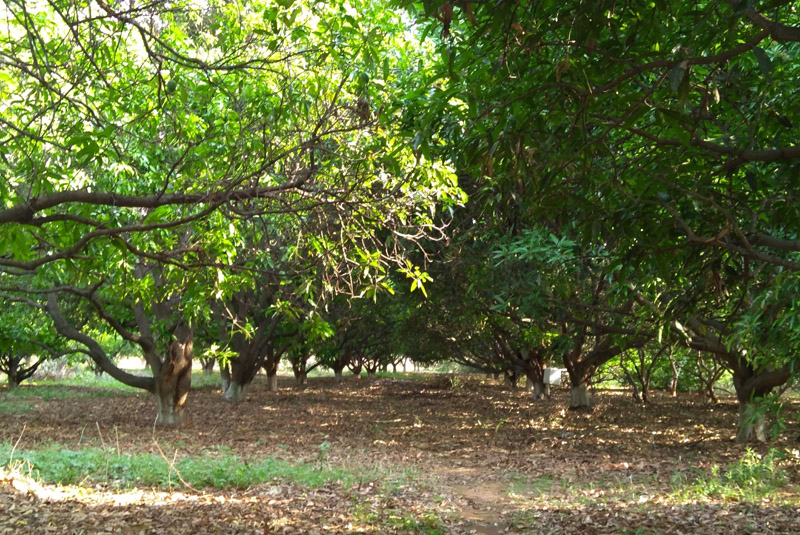In 2005, Shyam Sunder Paliwal became the head of Piplantri, a village in Rajasthan. Like many of India’s villages, Piplantri was dominated by men; girls of the family were considered a financial and social burden.
The area around Piplantri was into marble mining. Due to mining and the dry weather conditions of Rajasthan, the land around the village had become dry, and the vegetation had deteriorated. Then, in 2007, Paliwal’s seventeen-year-old daughter, Kiran, passed away from dehydration. This event changed the fate of the entire village.
Struck by grief, Kiran’s family planted a tree right outside the village to mark her death. ‘This is the day we understood the true value of a girl,’ said Paliwal. Kiran’s death inspired her father to fight for the rights of girls and empower them to succeed. Under Paliwal’s leadership, the act of growing a tree in her memory turned into a wider programme.
Every year, 60-65 girls are born in the village of Piplantri, which has a population of approximately 5,500. Villagers plant 111 trees when a girl is born to celebrate the event. Now, the girl-child, who was once considered a burden on the family, began to receive honour. Alongside this feminist movement, the programme regenerated the dry and barren land around the village.
Paliwal’s idea to honour his daughter became a broad eco-feminist movement.
‘If we can do it in one girl’s name, why not do it in every girl’s name?’ asked Paliwal. The village collectively signed up to empower every girl in the village to ensure a brighter future for them. Along with tree planting, parents of girls must sign an affidavit stating that they would not marry off their daughters before they reach the age of 18 and will let them complete their education.
The residents of Piplantri also guarantee that every girl child will have financial stability by the time she reaches adulthood. To ensure that, when a girl child is born, the villagers accrue Rs 21,000, take Rs 10,000 from the parents and place it in a fixed deposit that may be accessed by the girl when she reaches the age of 20.
Since 2007, the region has added over 350,000 trees, covering 1,000 hectares. The trees are of different varieties, including mango, gooseberry, sandalwood, neem, peepal, bamboo, and even sindoor, which don’t usually grow in the region.
The ritual of planting trees to honour the birth of a girl child is carried on as the girls grow older. These trees have become a part of the community as the family cares for them like their own members. Every year, during the festival of Rakshabandhan, the girls tie the rakhi around the trees and saplings as if they are siblings.
The entire community is dedicated to protecting the environment. Groups of men and women till the land regularly to prepare the soil for planting more trees. In addition to the trees grown during the birth of the girl child, the village has an annual event in August where all the girls born in the preceding year are celebrated by planting more trees.
Even though the event only occurs once a year, the work for the celebration continues throughout the year. The community takes great pride in the work, and everyone in the village joins hands to keep progressing. The village also plants trees upon the passing of their fellow members of the village. Eleven saplings are cultivated to celebrate their lives.
‘Historically, people from this region of [Rajasthan] are warriors who have never accepted defeat. And neither will we,’ said Paliwal. ‘In earlier centuries they fended off attacks, now we fight disease and pollution,’ he said.
The villagers’ work in Piplantri has shown visible results in improving the environment, and in return, these trees have offered many positives. Besides making the village lush green, the groundwater level has increased in the area. These trees also symbolise the change in the status of girls in the village.
Since the village started celebrating the birth of women, families feel pride in having a girl child. In an interview with the BBC, a local woman explained how she had two sons and was never blessed with a daughter. The shift in social views of the village made her wish for granddaughters. ‘Earlier, they were considered a burden. Now, we don’t think that way. We have no particular desire for sons,’ she said.
Planting trees and regenerating the environment has paved the way for financial freedom for women in the community. Women’s cooperatives established by the villagers have created jobs by producing herbal products from aloe vera. Over 2.5 million aloe vera plants have been planted around trees to keep termites away. They plan to expand it to products from gooseberries, bamboo, and honey, all available through the plants the village has nurtured.
The before and after pictures of the area show how Piplantri has transformed over time. The village has also adopted methods of water harvesting by building ditches, bunds, damns, and trapping water runoff.
Whenever a new village head or a sarpanch is chosen, they take an oath by a banyan tree to continue the work to protect the environment. The villagers encourage officials who visit the village to do the same, promoting and spreading the eco-feminist movement of the little village across its borders.
Nimisha Gupta, the chief executive officer of the district’s local government, acknowledged Piplantri for taking advantage of government schemes and budgets, which are not common in their villages. ‘I can see a vast difference between 2007-08 and now, and it shows you how one person can effect change,’ said Gupta, commending the efforts of the former Sarpanch, Paliwal.
The state government of Rajasthan has used the ‘Piplantri Model’ to train and educate people on regenerating the environment. A training centre has been established to host engineers, officials, and people from different parts of Rajasthan and the country who wish to adopt the Piplantri Model of harvesting water and planting trees to better their towns and cities.
‘When you attach it [environment] to tradition and make trees like family members, it makes sense emotionally,’ says Gupta. The eco-feminist movement thrived because taking care of the environment has become part of the culture of the village. It has brought people together, creating a stronger sense of community.
The crime rate in the village is very low. Education is mandatory, regardless of caste and religious background. There are nine government-run village schools in Piplantri, and the enrollment ratio of girls to boys is 33:19, with no dropouts for the past ten years.
Girls are encouraged to become self-dependent as they grow. These girls grow up to value their culture, find security within the community, and nurture the environment.
-30-
Copyright©Madras Courier, All Rights Reserved. You may share using our article tools. Please don't cut articles from madrascourier.com and redistribute by email, post to the web, mobile phone or social media.Please send in your feed back and comments to [email protected]











